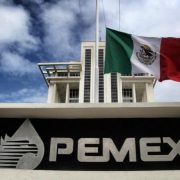
A border tax floated by aides to U.S. President Donald Trump is “not a good idea” for bilateral energy trade, a senior Mexican official said on Wednesday, also confirming that Mexico’s second-ever deepwater oil auction would happen this year.
A 20 percent border tax on Mexican imports to the United States has been pitched by the Trump administration as one way to force Mexico to pay for a new border wall, a top campaign promise.
Separately, a so-called border adjustment tax has been proposed by the new administration and its Republican allies in Congress that in theory would tax imports but not exports.
Both proposed taxes face opposition from U.S. oil refiners and automakers, among other sectors, warning they would raise consumer prices.
“We don’t see this kind of a tax as a good idea,” said Aldo Flores, Mexico’s deputy energy minister for hydrocarbons.
“Our position continues to be that free trade and the free flow of these goods has benefited both countries, strengthening the energy security of both,” he said.
Relations between the United States and Mexico are especially tense as Trump has threatened to upend nearly a quarter century of free trade, deport millions of illegal immigrants and build his signature border wall while getting Mexico to pay it, something the Mexican government has said it will not do.
For decades, the two neighbors have nurtured a robust cross-border energy trade, with crude oil produced by state company Pemex sold to U.S. refiners, while American producers sell natural gas and fuels like gasoline and diesel to Mexican buyers.
Last year, the total value of U.S. energy exports to Mexico totaled $20.2 billion, while Mexico exported mostly crude oil worth $8.7 billion to the United States, in a reversal of the historic balance of energy trade between the two countries, according to U.S. Energy Information Administration data.
Similarly, Mexico’s crude shipments could be pressured if the United States approves the new Trump-backed permit for TransCanada’s (TRP.TO) proposed Keystone XL pipeline and the project brings new supplies of Canadian heavy crude to U.S. refineries.
“Supposing that (the pipeline) is completed, that changes the competitive playing field for Mexican crude,” said Flores, adding that producers of oil in Mexico would have to be more creative in how they market their output.
DEEPWATER AUCTION
Mexican and Canadian heavy crudes have competed for years for buyers among U.S. Gulf coast refineries.
While Mexico’s oil regulator is planning three new oil auctions later this year, covering shallow water and onshore fields, a new deepwater auction is also planned.
“It will be toward the end of the year,” said Flores, who also sits on the Pemex board and took over as deputy energy minister in August.
He declined to specify where the deepwater blocks would be located.
Flores added that a first-ever auction of shale oil and gas blocks would “probably” be scheduled, noting that necessary regulations would be published before the end of the year.
Last year, Mexico concluded four first-ever oil auctions, part of a landmark energy opening finalized in 2014 that ended Pemex’s decades-long monopoly, including a December deepwater auction that awarded 10 blocks to a wide range of international oil majors.
While Mexican crude output has declined over the past dozen years from a peak of 3.4 million barrels per day, Flores said he expected output to total 1.9 million to 2.0 million bpd in 2018, similar to a forecast of 1.94 million bpd for this year.

David Alire Garcia and Adriana Barrera / Reuters
Wed Feb 15, 2017 | 8:09pm EST
Scroll to top








